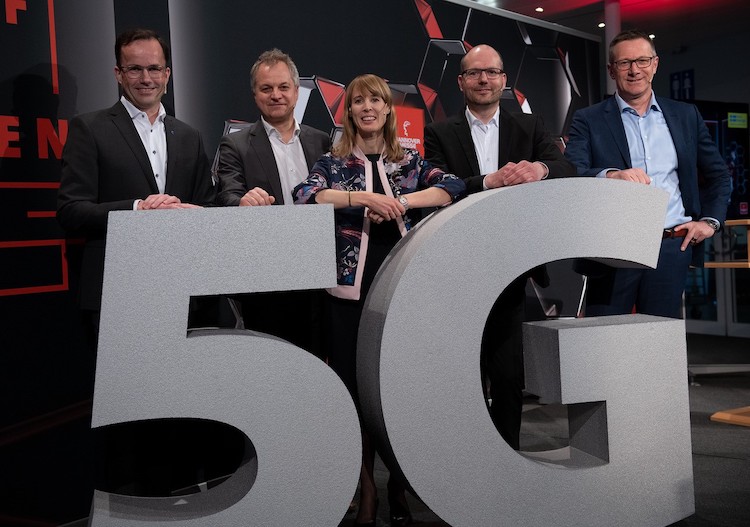
Hannover Messe to showcase Industry 4.0, AI and 5G this year
Hannover Messe this year aims to show visitors the path ahead to tomorrow’s factories with in-depth coverage of Industry 4.0 technologies, artificial intelligence, 5G, lightweight construction and the future of work.
Sporting a significantly enlarged conference program, it will also be a major dialogue hub for forward thinkers from industry and government.
The organising company of the world’s leading trade fair for industrial technology says the event is heading into its 2019 opening day in “very strong form”. Over five days, from 1 to 5 April, it will feature 6,500 companies from 75 nations.
Global corporations, mid-size companies and startups – they will all be there to present their solutions for industrial production and tomorrow’s sustainable energy supply systems.
Hannover Messe 2019 will be formally opened by German Chancellor Angela Merkel in partnership with Stefan Löfven, Prime Minister of Sweden, as the nation being honored as this year’s Partner Country.
Dr Jochen Köckler, chairman of the managing board of the show’s organizer, Deutsche Messe, says: “Hannover Messe is the only platform worldwide that provides an holistic, integrated perspective on the key themes and trends shaping the future of industry.
“Only at Hannover Messe can visitors from the manufacturing industries and the energy sector gain such a comprehensive overview of the application scenarios and potential of Industry 4.0, artificial intelligence, 5G and Smart Energy.”
Hannover Messe 2019 will be devoting considerable attention to the new opportunities and possibilities opened up by the use of artificial intelligence in industrial production.
This is heralded by the show’s lead theme, “Industrial Intelligence” – the banner under which companies from all around the world will showcase more than 100 application examples of machine learning.
“Artificial intelligence is the heart of Industry 4.0,” says Köckler.
“The ability it gives us to analyze vast amounts of data and arrive at informed decisions is what makes customized mass production possible,” he adds, putting the focus on developments like collaborative human-robot workstations in which robots assist their human counterparts and enable them to concentrate on tasks that require higher cognitive ability.
This year, for the first time, Hannover Messe will feature a large-scale 5G testbed. Network equipment providers and users will use the testbed to demonstrate the kinds of functionality that the new mobile telephony standard will be able to deliver.
Köckler says: “The ability to transfer large volumes of data in real time while maintaining high standards of data security is absolutely fundamental to the digital integration of industry.
“In Hall 16, we and our technology partners from Nokia and Qualcomm will be building a real, functional 5G network.”
The network will comprise eight showcases, all connected via the 5G standard, with highlights including industrial robots managed and controlled via 5G and a model automotive production plant.
Köckler says: “The world has never seen such a diverse range of 5G industrial use examples in a real, working 5G network, all under one roof.”
Another future-defining technology to which Hannover Messe is devoting greater attention this year is lightweight construction.
Alongside numerous application examples of lightweight technology at the exhibition stands, the show will, for the very first time, feature a conference on lightweight construction: the Lightweighting Summit.
Organized by the German government, the summit is an opportunity for experts from government, industry and research to meet and jointly develop a strategy for making Germany a leader in the field of lightweight technologies.
In other firsts, the Hannover Messe 2019 program will include a Future of Work in Industry conference and an Industrial Pioneers Summit.
The Future of Work in Industry conference is part of a drive by Hannover Messe’s organizers to facilitate greater discussion on how the digital transformation of industry is affecting the way people work.
In the course of keynotes, panel discussions and best-case presentations, big-name speakers – such as Siemens’ chief human resources officer and managing board member Janina Kugel, VW central and group works council chairman Bernd Osterloh, and SAP’s Christian Boos – will outline ways in which companies can get their workforces ready for the future.
The Industrial Pioneers Summit is devoted to discussion on digitization, AI, human-machine collaboration and platform business models.
The invited participants are forward thinkers and champions of innovation from industry, government, business, science and society generally.
They will be there to share their expertise, opinions and theories on current developments and future scenarios and jointly formulate a vision for 2025.
Forward thinking and vision are also qualities that describe Sweden, this year’s official Hannover Messe Partner Country.
Sweden has long been a symbol of progress, innovation, and openness to new technology, and at Hannover Messe more than 160 Swedish companies will be showing why.
Among them will be multinational corporations like Ericsson, ABB, Tetra Pak and SKF, as well as startups and, of course, research institutes.
Themed “Sweden Co-Lab”, this year’s official “Partner Country” showcase is an opportunity for Swedish companies to profile themselves to the world as providers of Smart Industry solutions.
The theme “Sweden Co-Lab” embodies the two key concepts of co-creation and innovation that symbolize Sweden’s role as source of pioneering ideas for advanced technologies and a trusted partner in international cooperative ventures.
Main picture (from left): Dr Jochen Köckler, CEO, Deutsche Messe AG; Thorsten Robrecht, vice president – advanced mobile networks solutions Nokia Solutions and Networks; Anna Liberg, executive director of business Sweden, The Swedish Trade & Invest Council, Germany; Professor Dr-Ing Martin Ruskowski, head of research innovative factory systems German Research Center for Artificial Intelligence; and Rolf Najork, executive director, Robert Bosch.
